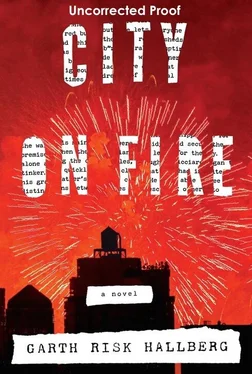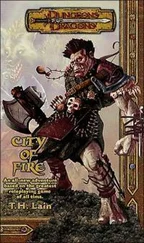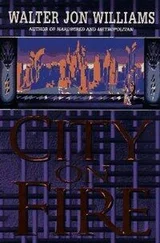In fact, it was a hell of a lot farther than that. The old man was obviously capable of forward progress, but on Keith’s arm, and in deepening snowfall, he locomoted only in tiny, truculent shuffles. It took ten minutes to travel the first hundred yards; crossing Fifty-Ninth was even slower. Keith wondered if in fact he was terrifying the man rather than helping — if the man perhaps understood himself to be being kidnapped. He appealed silently to passersby for help, but they had engagements of their own to get to, and, knowing the obligation he aimed to put them under, they pretended not to see him. Clearly, God meant the old man to be Keith’s responsibility.
By the time they reached the no-man’s-land east of Grand Central, Keith’s bare hands were numb, his waterlogged grocery sack starting to split. He had no idea what time it was; Samantha might already have given up waiting on him. Finally, before a run-down building, the man ceased to move. “This?” Keith said. “This is where you’re going?” Zees where yoor go-ing? “ Domicilia? La casa? ” Tentatively, he released the sleeve. The man slumped against the bars of the little fence that protected the garbage cans from whatever garbage cans needed protecting from. His hands curled around the bars. “Zay hallah ear,” he said, it sounded like, and licked spittle from his lips.
Keith shook off a little shiver of déjà vu. “Come on, sir. Let’s get you inside.”
But the man would not let go. “Day allah here,” he insisted. Or was it a question? He looked past Keith’s shoulder, eyes widened fearfully. A gypsy cab slipped past on the snow-slick street. Obstinate old thing. Keith detached himself and went to peer into the lobby, hoping to find someone who knew the man and could let him in, assuming this was his building. He saw smoke-damaged carpet, stacks of yellowed phone books along one wall, an elevator light stuck on the fourth floor, but no people. Who left a deranged old man alone like this?
He recalled, out of nowhere, a book of the Arabian Nights he’d bought Will for Christmas one year. Or rather, that Regan had bought on his behalf. Laminated covers, watercolor plates, the smell of glue from the binding. Sometimes, when he got home in time, he had to read to Will from it. The story Will asked for, over and over, was about an old man who asked a traveler to carry him across a river. Once he was on the traveler’s back, the man refused to let go. Will hadn’t seemed perturbed, but Keith found it creepy, especially the illustration: the old man’s pale blue skin, his sinewy legs squeezing the air from the chest of his patron, now his slave. An allegory of paternity, maybe, or of romantic love. Nor could he recall how the spell finally got broken, as in stories all maledictions must at some point break. Was this only a feature of stories?
Suddenly a young woman was beside him, precipitated out of the snow. She was full-lipped, Dominican or Borinquen, in a short skirt and fishnets that wouldn’t help with the cold. “Isidor,” she said. “You bad boy.” She coaxed the old man off the iron fence as you might a rose from a trellis. “You’re playing your trick on this fine gentleman, aren’t you?” The old man’s palsy, at this distance, resembled triumphant nodding. She turned to Keith. He could see that she was not young at all — she was probably his age — but was so thickly rouged and mascara’d that in the headlights of a passing car, say, she might look like an extra from a porno film. The roll of fat peeking between her waistband and her parka, like excess material left over from her manufacture, only made his feelings toward her more tender. “He does this to people. I don’t know why. He walks fine.” They watched the old man shuffle pigeon-toed toward the door of the building. A painted nail circled around an ear. “ La locura. ” And then, after sizing Keith up once more, she sashayed off toward the corner.
Watching her go, Keith was struck by the supreme joke: he knew this block. There, on the corner, was the strip club called Lickety Splitz. And just next door was the by-the-hour hotel where he used to bring Samantha, outside of which off-duty go-go girls would mingle with cross-dressed hustlers from over on Third Avenue. He squinted against the snow. Something in him deflated. Downtown, uptown; what was the point of trying to decide anything? He dumped his bag of groceries inside one of the battered ashcans and set out after the stripper. It was as if, he told himself, the decision had been made for him. As if this were not his own brain telling him that every avenue away from his sins led him deeper into them. The sound of the white touching down all around him was like the sound of feet behind an arras, or like tiny, glottal laughter, if not of God the father, then perhaps of one of his angels, archangels, principalities, thrones, dominions, powers, seraphs, he’d known them all by heart as a choirboy in Stamford. What was the last one? A bird arced high above him, rooftop to rooftop. Oh, right, the cherub, the cupid, the little laughing boy.
BUT WHAT HAD HE BEEN DOING THEREto begin with? Why that day, at that particular hour? (And behind that, like a faint perpetual wind-chime: Why me, and not nothing at all?) Soon enough, William Hamilton-Sweeney would have cause to revisit these questions. At the time, though, he would have said he’d gone to Grand Central for exactly the reason he’d given Mercer: to be alone. For years, he’d been coming here when he needed to think, or not think, or to act or not act on the things he did or didn’t think about. Granted, there was also all the architectural whatnot that used to knock him out in his youth, the arches, the sconces, the vaulting blue zodiac at the center of everything where pigeons roosted among the stars. But grime had long since dulled the color and advertising ruined the lines. What abided was the sense of any one person’s life tapering amid the crowds to a meltingly thin slice. Proximity to the forty-story office tower bearing the family name had once raised the possibility of scandal, or pity, but any suburb-bound underling of Daddy’s he’d bumped into on his way up from the lower level likely wouldn’t even have lowered his eyes from the departure board before rushing on. And if anything, the years had rendered William’s anonymity here more vivid and complete. In the circles he now moved in (to the extent that he still moved in circles at all) to cross north of Fourteenth Street, at least east of Eighth Avenue, was to sail right off the edge of the earth.
He stood now near a staircase, waiting to see just how badly the betrayal with the envelope had shaken him. Memories of Mercer’s plaintive look threatened to shade into memories of his mother, but then he did the thing a drawing teacher had once taught him of flowing out into the world, of letting his eyes forget what they were supposed to be seeing. You are what you perceive. He perceived pantlegs bearing the sooty imprints of escalators. Street-level doors blowing open to admit the ringings of Salvation Army Santas. Goldish particles sifting through slabs of sad late light, paper pulp and cigarette ash and the shed skin of Americans. The crowds were about what you’d expect with the holiday, and even that was an illusory kind of presence. Really, these pitiable consumers hurrying past with their last-minute packages were already up in Westchester, in fuzzy slippers, watching the Yule log burn. Only the rare soul, William was thinking, was ever truly here, when out of the archway that led to the 7 train skulked a hulking punk named Solomon Grungy.
He would have been hard to miss even without the safety pins or the blindingly white hockey uniform or the big duffelbag on his shoulder. He was six foot six and seemed paler than usual, his mouth pinched like a rabbit’s. It was with some relief that William noticed his eyes were still on the floor. And then, as if sensing danger, they weren’t. To pretend not to see him would tax credulity. How much simpler the world would be if people could admit openly to hating each other! On the other hand, this was not that world. And William still believed, questions of utopia aside, in the social graces. “Sol!” he said, straining for warmth.
Читать дальше












